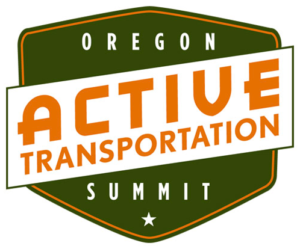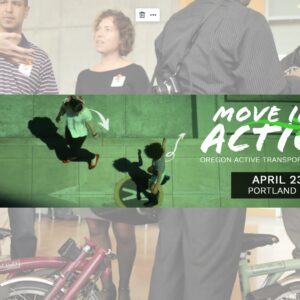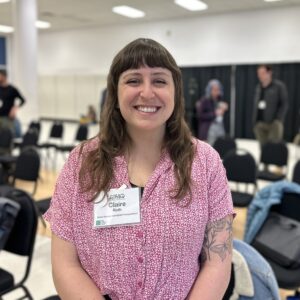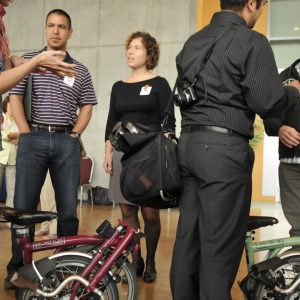
(Photo: Jarrett Walker)
Starting this Sunday with mobile tours and a social mixer, transportation reform activists from across the region and state will gather in Portland for the annual Oregon Active Transportation Summit. The event, hosted by The Street Trust, offers three days of presentations, workshops, speeches, and more.
Taking place this year at the Oregon Zoo, the event (3/19 – 3/21) also includes the Oregon Safe Routes to School Annual Meeting and the Oregon Bicycle Tourism Conference (presented by Travel Oregon). If you care about making it easier to bike, walk, or take transit in Oregon — or if you are a professional in the field seeking to learn the latest best practices — you should consider taking part.
The main event kicks off Monday morning with keynote speaker Jarrett Walker. Walker is a transit consultant based in Portland and author of the book, Human Transit: How clearer thinking about public transit can enrich our communities and our lives. Walker also maintains blog, has a Ph.D. in Drama and Literature from Stanford University, and is only person with peer-reviewed articles in both the Journal of Transport Geography and Shakespeare Quarterly.
Monday’s lunch keynote will feature a panel discussion on how Los Angeles and Seattle were successful in raising billions of dollars for active transportation projects in the 2016 election. The panel will be moderated by Noah Siegel, Policy Advisor, Strategic Partnerships at Metro and will include: Shefali Ranganathan, Executive Director of Transportation Choices Coalition; Gerik Kransky, Policy Director of The Street Trust; and Noel Mickelberry, Executive Director of Oregon Walks.
Advertisement
Between the plenaries will be three breakout sessions where experts will share knowledge on a wide range of topics from Vision Zero to best practices in engineering and from marketing to community engagement and social justice.
On Monday night there’s a free PechaKucha presentation party at McMenamins Mission Theater & Pub. Here’s the lineup:
1. Gwen Shaw, Better Block PDX— The Better Naito Story
2. Aaron Brown, Oregon Walks— The Medium is the Message: Building Coalitions for Complete Communities (and Winning Money for Streets)
3. Bandana Shrestha, AARP— We Are Walking Here
4. Steph Routh, Community Cycling Center— It’s Not About the Bike
5. Kelly Rodgers, Streetsmart— Evidence and Insight for Better Transportation
6. AJ Zelada, Fremont Family Vision— Elderly on the Go
7. Kristen Lohse, Toole Design Group— A City-wide Plan for Off-Road Cycling: Expanding Opportunities for Activity and Connection with Nature in the City
8. Becky Strickler, Cardno— Tualatin River Greenway Shared Use Path
9. Matt Childs, Sportworks— Trends in Bike Parking
On Tuesday, Travel Oregon steps in to present the Bicycle Tourism Summit. This year’s summit will include sessions on: advancing a statewide trails association in Oregon; an update on the Oregon Timber Trail; and a session on “inspiring world-class cycling networks.” The lunch keynote will be given by Louise Böhler of the German National Cyclists’ Association, a group with over 160,000 members. Böhler will share their recipe for success and present on the ingredients needed to build up a successful cycle tourism destination.
Learn more about all the offerings, register to attend, and download the current agendas here.
Read our past coverage of this event in the archives.
— Jonathan Maus: (503) 706-8804, @jonathan_maus on Twitter and jonathan@bikeportland.org
BikePortland is supported by the community (that means you!). Please become a subscriber or make a donation today.








Thanks for reading.
BikePortland has served this community with independent community journalism since 2005. We rely on subscriptions from readers like you to survive. Your financial support is vital in keeping this valuable resource alive and well.
Please subscribe today to strengthen and expand our work.
I browsed the intro to his book, Jarett Walker has available to read on the web page for his book. Not surprising that he would regard public transit to be bus, trolley, and light rail forms of transportation. Those forms of transportation are what I suppose everyone has come to associate with the term ‘public transit’
Doesn’t bike share add a little dimension to that standard association? That bike share users have to propel this form of transit on their own muscle power, shouldn’t obscure the fact that bike share is a form of public transit.
Additions to the road way in the form of bike lanes, couldn’t likely be considered to be, let me call it, ‘self-powered public transit’…but if the city were ever to think about a full fledged more or less standalone basic cycle path inner city connecting network with a large daily bike commuter capacity, and try build it…such a thing might rise to be within the description of public transit. Just wondering.
Many people seem to regard and perceive of infrastructure for biking, with indifference…bewilderment…uneasiness, resentment. Too many people of the public seem to feel this way. Biking infrastructure doesn’t seem at all to be regarded as essential for public travel, in some similar manner to which bus, trolley, and light rail forms of public transportation are. This may be part of the reason that public enthusiasm for and support of bike infrastructure, tends to be modest.
I wish I knew what “the public” thinks, but I’m not convinced anyone does. Public transit is used by (exclusively or mostly) the poor? Bikes are the choice of (take your pick) the Lycra-clad or street people hauling bags of deposit cans?
Cities (those that theoretically are already enlightened) – stop giving a &$#@ about what people might think and do what you already know is right. Regardless, you’ll piss people off. That’s a given – piss off those whose judgement you don’t respect and work with those of us whose goals align.
mh
“…Bikes are the choice of (take your pick) the Lycra-clad or street people hauling bags of deposit cans? …” mh
Well, that’s kind of funny to read, but not really accurate, I don’t think. Situation isn’t a gloomy as you suggest. Even out in Beaverton, there seems to be a fair number of enthusiastic, well employed people using bikes for commuting. You can tell, by the bikes and the gear they use: quality bikes, not exclusively billboard lycra, and not entirely thrift store scores.
Bike commute infrastructure out here though, is still challenging to use. If I can use that term to refer to the hodgepodge patchwork network of bike lane routes throughout the city. There is not a single, bike travel prioritized travel road out in Beaverton, that I know of. Not really in Portland either (springwater corridor is a ‘sort of’.). What I mean, is no basic bike travel routes, wide, not directly adjoining road main travel lanes or separated only by a curb; distanced, like 50′ or so, from the road…something that people not feeling good about riding in or directly next to motor vehicle traffic, would feel good about riding.).
I don’t think the kind of bike travel prioritized travel road I’m thinking of, needs to be along every major road in the city, at least not for starters…but it does seem to me that it could be very worthwhile to put some energy into conceiving at least one well designed and developed route for north- south, and one for east-west travel, connecting some major destination points along the route, as is possible.
Whatever is built, should be good enough to compete some with the sybaritic comforts almost anyone today, regardless of how rich or poor they are, can easily enough riding in some form of motor vehicle. To capture the public’s active interest and support, it should be a showpiece too…kind of an ordinary person’s dream bike street.
Portland has done ok in past with some public projects that were roundly dismissed at inception: like for example, the eastside esplanade, and the tram to the hill. Lots of people/the public, seemed to think those were outrageous wastes of money(and at the time, they were at least, a lot of money.)…taxpayer dollars. Today, both seem to have done fairly well, especially the eastside esplanade, in inspiring people to be more active, and in showing how the city can become a better city. My thinking, is that kind of bravura project, is exactly what cities, like mine, Beaverton, and Portland, need to have people, the public, be able to recognize the great things that excellent provision for bike travel can offer them.
Another panel discussion about how other cities can do what Portland (and Oregon) can’t do.
Bottom Line: No money.
Solution: Sales tax and, for heavens sake, get PERS under control.
Without a doubt, PERS is absolutely killing us.